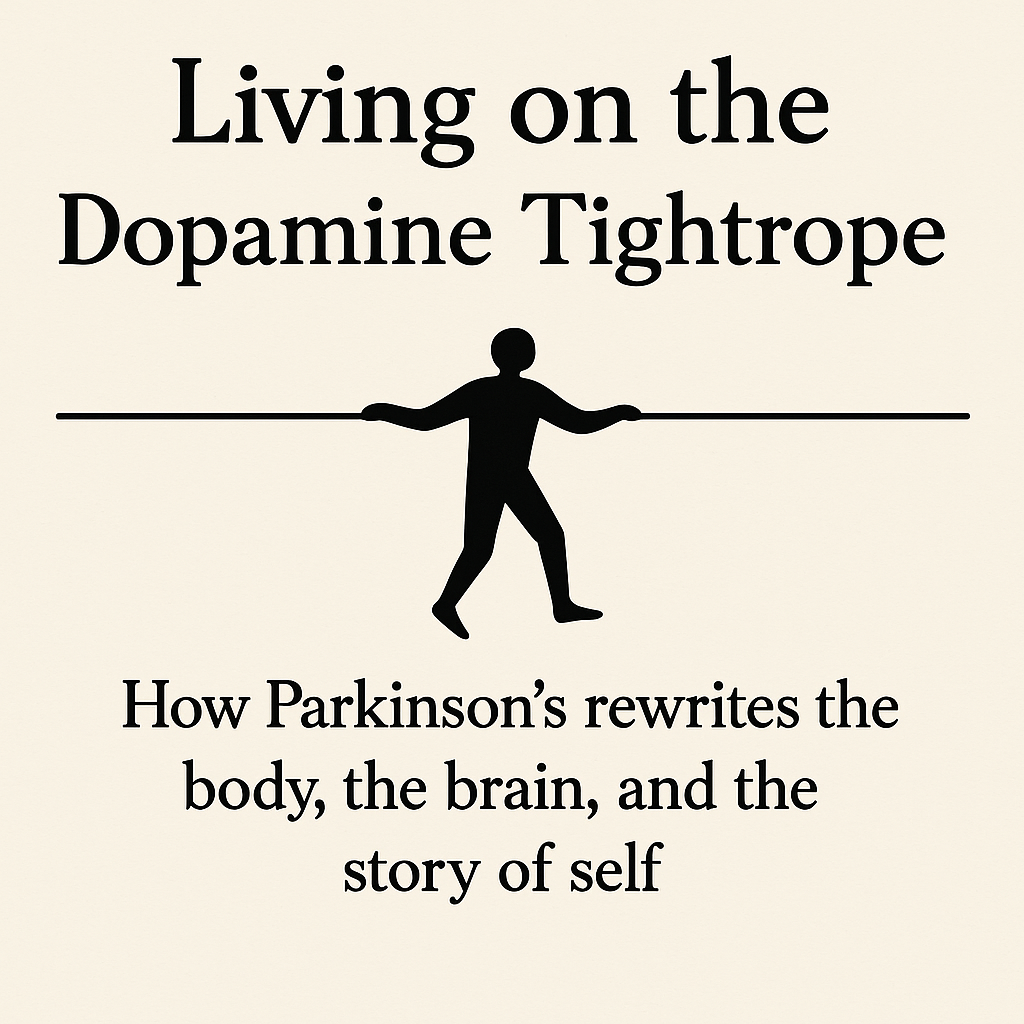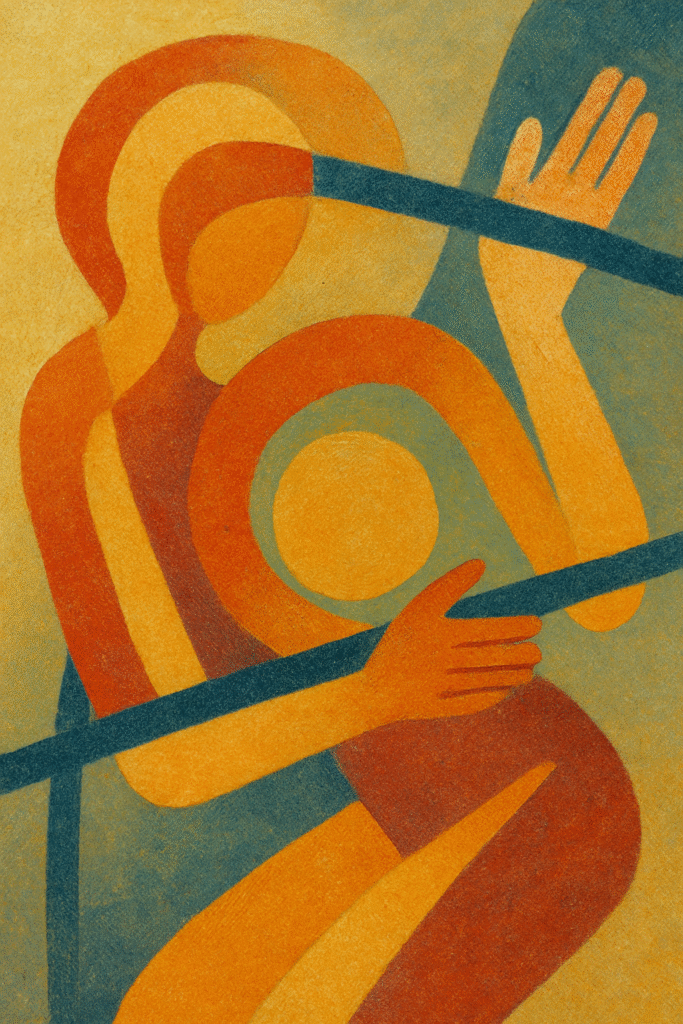
ChatGPT:
Living With Parkinson’s: How Humor, Stories, and Small Victories Help Rebuild the Self
“You Won’t Die of Parkinson’s”
“You won’t die of Parkinson’s,” Steven Heller recalls his first doctor saying, “something else will take care of that.”
It was meant to reassure. Instead, it captured the strangeness of Parkinson’s disease (PD): a condition defined in textbooks by tremors, stiffness, and slowness, but lived in bodies and minds as something far more disruptive. Parkinson’s doesn’t just shake hands. It reshapes mood, motivation, perception—even identity.
Two longtime friends, both art directors, offer a window into this reality. Steven Heller, 70, has lived with PD for more than a decade. Véronique Vienne, 79, was diagnosed only recently. Their email exchange is part confession, part comedy, part survival guide. Together, they show what it means to live on what one neurologist calls “the dopamine tightrope.”
Steven: Humor Against Worthlessness
Steven knows the cycles of PD too well. Some mornings he wakes up feeling worthless—not because he can’t do anything, but because he doesn’t want to. That’s apathy, one of the most debilitating symptoms of Parkinson’s, driven by dopamine depletion in the brain’s reward circuits.
For someone who’s spent his life measured in creative output, apathy feels like identity theft. And yet he cracks jokes: about getting seasonal work as a Christmas bell-ringer, about people’s awkward attempts to ignore his tremor. Humor becomes a prosthetic limb, helping him move through the world when his body won’t cooperate.
Véronique: A World Out of Joint
For Véronique, the first signs were stranger. The floor seemed farther away. Folding underwear felt like catching fish in a bucket. Space itself felt wrong, as if she were walking through a Dadaist installation.
This isn’t imagination. PD often warps visuospatial processing, the brain’s ability to gauge distances and body position. But because it didn’t look like tremor, doctors missed it. She was scanned, X-rayed, and misdiagnosed until a neurologist finally named it—within minutes.
Véronique responds not with jokes but with metaphors, comparing her sensations to Duchamp’s staircase and Schwitters’s labyrinths. It’s not just art talk. It’s a way to reclaim authorship over a body that feels foreign.
The Dopamine Tightrope
Both Steven and Véronique live on the dopamine tightrope. PD robs the brain of dopamine; medication restores it—clumsily.
- Too little dopamine: apathy, depression, inertia.
- Too much dopamine: compulsive behaviors, frantic urgency, overcommitment.
Steven leans toward the deficit side: mornings of inertia, creative despair. Véronique, at times, tips toward surplus: grand gardening projects, the urge to reinvent herself with a novel.
Neither state is simply “personality.” It’s chemistry shaping selfhood.
What Helps: Coping in Practice
Parkinson’s can’t be undone, but it can be lived with. Steven and Véronique’s correspondence, backed by research, suggests practical ways forward.
Humor and Metaphor
Laughter and language transform fear into something bearable.
- Share small absurdities with friends.
- Use metaphors when symptoms feel indescribable: “the floor is dropping away” is more powerful than “I feel unsteady.”
Owning the Story
Illness changes how others see you. The trick is to reclaim the script.
- Prepare a short line for disclosure: “Yes, I have Parkinson’s. No, I haven’t stopped living.”
- Decide case by case who needs to know. Control belongs to you, not the disease.
Redefining Productivity
Output will change. Meaning matters more than volume.
- Set “micro-goals”: a page written, a short walk, a call made.
- Use adaptive tools—voice-to-text, flexible deadlines, collaborations.
- Celebrate quality over quantity: one joyful project beats ten rushed ones.
Exercise as Medicine
Few interventions are as effective as movement—for body, brain, and mood.
- Choose activities that spark joy: dance, cycling, tai chi.
- Make it social—classes or group walks keep motivation alive.
- Start small. Ten minutes a day is victory enough.
Support Networks
Parkinson’s is not lived alone. Families, friends, and peers matter.
- Join a PD support group. “Me too” is powerful medicine.
- Don’t shield loved ones completely; honesty usually lands better than silence.
- Connect with mentors—people further along who can model resilience.
Meaning-Making
Ultimately, coping is about identity.
- Explore creative outlets—art, writing, gardening.
- Revisit spiritual or philosophical practices that offer continuity.
- Allow grief for the old self, but curiosity for the new one.
Why Stories Matter
Clinical papers can tell us that 40% of PD patients experience apathy, that visuospatial deficits increase fall risk, that depression is common. Only patients can describe what it feels like: underwear slipping through your fingers, mornings too heavy to begin, space itself closing like a coffin.
Steven and Véronique remind us that Parkinson’s is not only a neurological condition but a narrative one. It doesn’t just attack neurons; it rewrites the stories people tell about themselves.
The Last Word
Parkinson’s is progressive, incurable, disruptive. But it is not unlivable. Coping is mosaic work: medicine, humor, exercise, creativity, community.
Perhaps Véronique puts it best: “The new me is someone I don’t know yet.” That is the paradox of Parkinson’s. It strips away, but it also forces discovery.
The self remains—slower, shakier, but still alive, still telling the story.

